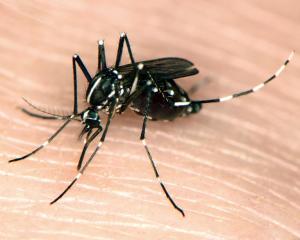Sussex County man tests positive for West Nile Virus
After a 60-year-old Sussex County man recently tested positive for West Nile Virus, the Division of Public Health is asking Delaware residents to protect themselves against mosquito-borne illnesses.
“With the appearance of this disease in a person, along with an accompanying increase of West Nile Virus in wild birds, we want to urge everyone to protect yourself and your loved ones from mosquito bites. These bites can cause much more serious health problems than just itching and discomfort,” said DPH Director Dr. Karyl Rattay in a prepared statement Aug. 8. “This is an early start to the transmission season for West Nile Virus, and it is concerning that we could see more cases this year in humans than in past years.
According to a press release from the division, the man was briefly hospitalized for the illness in July and is the state’s first human case of West Nile Virus in 2018.
It may be the first human case, but officials from the mosquito control division of the Delaware Department of Natural Resources and Environmental Control said West Nile Virus detection in birds is occurring at about twice the usual rate.
According to the press release, a wild crow collected in Sussex County in late June was the first case of the virus in birds this year. Virus-positive sentinel chickens have been found at 10 of 20 stations around the state, with virus-positive stations found in all three counties. Thirteen WNV-positive wild birds have been collected from all three counties.
West Nile Virus is primarily transmitted to humans by the common house mosquito, but the Asian tiger mosquito can also carry the disease. Mosquitoes in Delaware can also carry other viruses, including Eastern equine encephalitis, chikungunya and Zika.
Earlier this month, the mosquito control division found Delaware’s first EEE-positive sentinel chicken for 2018 in a station in Sussex County. To date, no cases of Zika in the state have been linked with local mosquito or human transmission.
A lot of spring rain forced the mosquito control section to deal with a statewide eruption of adult mosquitoes from late May through the end of June. According to the press release, for the past two weeks, the agency has faced another onslaught of adult mosquitoes in coastal areas attributable largely to tidal flooding and rains.
To help combat swarming mosquitoes, DNREC urges homeowners to practice good water sanitation on their property by eliminating standing water.
To report suspected cases of human West Nile Virus, call the DPH Office of Infectious Disease Epidemiology at 1-888-295-5156. To report suspected case of wild birds, or for requests for mosquito relief call 302-836-2555 for areas north of Dover and 302-422-1512 for areas south of Dover. For West Nile Virus and Eastern equine encephalitis in horses and equine vaccines, contact the Department of Agriculture’s Poultry and Animal Health Section at 302-698-4500 or 800-282-8685 (Delaware only).











.jpg)











































